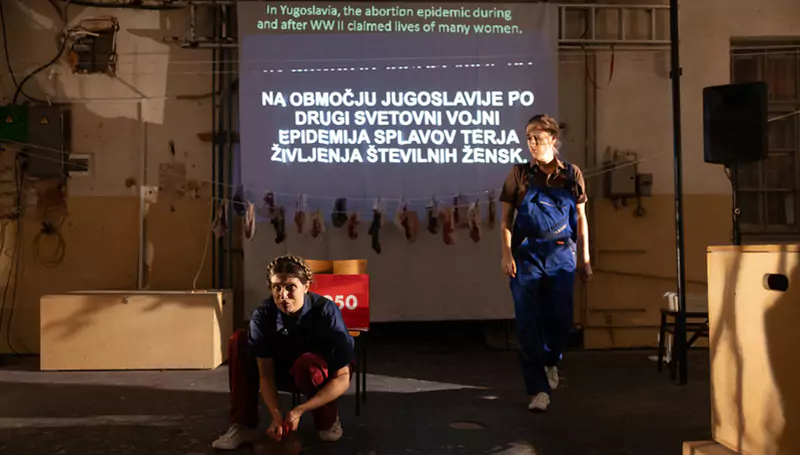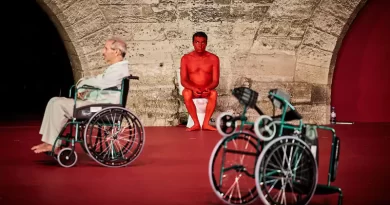The imagination of the Slovenian Theatre
Sasho Ognenovski in Kranj
1 June 2024
The Slovenian Drama Week is a global theatre event of the highest order that typifies the intersection of diverse theatrical influences and traditions in Slovenia. Having followed it for five years, I believe that it has become a paradigm in the region as well as in a larger European area.
Curated wisely, with a clear programming policy and great commitment to Slovenian drama and its movements, this festival has been talking about the tectonic plates of Slovenian drama in written and performed form for 54 years.
When you follow a festival like this, you can’t help but ponder Slovenian drama in terms of its thematic range, and more importantly, how directors bolt their ideas onto dramatic templates.
As every year, this festival, in addition to the main (competition agenda), also has an accompanying programme, as well as offerings for children and youth. At the beginning of the year, the selector announces his choices, these being a compact selection of plays based on Slovenian dramatic texts, classical and modern. So, the result is a cross-section of the best theatrical achievements in Slovenia.
This year, Alja Predan, one of the most important theatre critics, playwrights and translators as well as a reliable judge of Slovenian drama and theatre, made a selection of seven theatre pieces that in some way reflect the current situation in Slovenian theatre.
She explained in her report that she was seeking to ensure that this accommodated the current moment of the theatre and the social and public engagement of the projects themselves. The selection included the Sexual education II: diagnosis + consent + ability + play + struggle, a project by Tjaša Črnigoj, Lina Akif, Sandi Bakotić, Nika Rozman, Vanda Velagic, Tijana Todorović, Barbara Kapelj, Tea Vidmar and Lea Lekše.
Production was by “Nova pošta” from Ljubljana. It’s a show that in its five hours and 45 minutes brings a radical analysis of the essence of female sexuality from both a historical and modern perspective. Juriš, a play based on the works of Karel Destovnik Kajuh, was directed by Živa Bizovičar and produced by the Slovenian National Theater from Celje. The show deals with Second World War history and the fate of Kajuh himself in the whirlwind of post-war events in the late 1940s.
Antigone by Dominik Smole, now a classic dramatic play by one of the greatest Slovenian playwrights, deals with the modern interpretation of the myth of Antigone whose rebelliousness is seen from the point of view of other characters by virtue of the fact that Antigone is absent from the action. This is an interesting point of view from the young Slovenian director Luka Marcen. The perspective alludes to the autocracy that seems to have remained in the political scene even that of modern democracy.
Mrakijada is a sweeping theatrical production by the Slovenian National Theater from Ljubljana. It weighs in at almost four hours and is based on the texts of the lesser-known Slovenian playwright Ivan Mrak. The play is given an exceptionally radical vision by the young director Nina Rajic Kranjec. It’s a show that impresses with its expressive cruelty and strong rebelliousness in the interpretive space.
Rainy Day in Gurlich, a play by Milan Ramšak Marković, deals with social decline in family structures. The direction is somewhat minimalistic but the piece is exceptionally strong in terms of acting. The gentle non-interventionist direction is by Sebastian Horvat with production by the Preshern Theater from Kranj in co-production with the City Theater from Ptuj.
Pohorski Battalion based on texts by Jernej Lorenzi, Dino Pešut and other members of the cast, is directed by Jernej Lorenci and produced by the City Theatre from Ljubljana. It is a co-production with the City Theater from Ptuj. The selector Alja Predan chose texts that gave an accurate representation of the current directions Slovenian theatre across both classical and modern works. Readings by directors were interesting and showed sharpness of thought and purpose. The acting was universally first-rate.
The accompanying programme of the festival consisted of the plays: Something in the Air (Al Araf) based on a play by Vladimir Bartol and Simona Hamer, directed by Angjelka Nikolić. It was produced by the Slovenian Theater from Trieste.
Noli me tangere is based on a play by Draga Potočnjak and produced by “Nova pošta” from Ljubljana as a co-production with “Maska“ and “Moment” from Maribor; a play that talks about the political conflicts of famous authors and generally about the aspects of the artists’ engagement.
Taking a look at this segment of the festival, I had the impression that more chamber forms are represented here, played in very inspiring spaces such as “Stolp Škrlovec”, an extraordinary art centre for all types of theatre performances that in some way represent the alternative scene in Slovenia, although that alternative has its primacy in a global artistic background.
The children’s and youth segment of the festival included the play The Song of the Birds in the Canopies which in turn is based on a play by Jaka Smerkolj Simonetti. It was directed by Ivan Loboda and produced by the Prešern Theater from Kranj and AGRFT from Ljubljana.
Alma, written by Darko Erdelji and directed by him, was produced by the Puppet Theater from Maribor. Fairytales and Legends from the Grjance Hills is based on the stories of Janez Trdina and was directed by Maruša King. It was produced by the Margareta Schwartsvald, Cankarjev Dom, the City Theatre of Ptuj and the Slovenian Theater of Trieste.
What I would like to mention are the two performances that were out of competition but were of great importance for this festival. Firstly, Antigone based on the plays by Sophocles and Slavoj Žižek, directed by Mateja Koležnik, and produced by the Residenz Theater from Munich, Germany and the premiere of the Prešern Theater from Kranj at the very opening of the festival, the show Battle on the Throat, based on the texts by Prežihov Voranc and Lovro Kuhar, in the dramaturgy of Marinka Poštrak and directed by Jernej Lorenci, a very specific reading of the Slovenian classic Voranc, which talks about the social struggles of farmers before the Second World War, an author who in our climate is known for his strong social drama “Self-sprouting”.
“The Week of Slovenian Drama” traditionally awards every year the much-desired “Grum Award” for the best play, with which many important Slovenian playwrights have been crowned. This year in the nominations for this award were the drama texts: “The Best European Show” by Marko Bratuš and Haris Pašović, “The First Word is Mother” by Tjaša Mislej, “Unmarried Mothers” by Iza Strehar and “The Wake of a Winter Morning” by Daniel Dej Škifca. The jury consisting of: Rok Andres, Miriam Kičinova and Jakob Ribić awarded this year’s “Grum Award” to Iza Strehar, while the nominations for the best young playwright included: “Divergers” by Jaka Smerkolj Simonetti, “I go, you go, we go, slag 2 young people 4 4ever COME OUT LET’S BUZZ I’m afraid of too big eyes and too small bears we’re arriving at the last stop please back off I swallowed you and spit you out lightly chewed” by Brina Jencek and “Very Real Boy” by Tillen Oblak. The jury awarded this award to the young playwright Brina Jencek. Speaking of the awards this year, the jury of the festival consisting of: Aleš Jan (president), Pia Brezavšček and Mirna Rustemović awarded the prize for the best play to the play “Mrakijada” based on the plays by Ivan Mrak, directed by Nina Rajić Kranjec and produced by The Slovenian National Theater, and that play also got the acting awards that went to Tina Vrbnjak and Benjamin Krnetić for their roles in the same play.
The audience award went to the play Sexual education II: diagnosis + consent + ability + play + struggle, a project by Tjaša Črnigoj, Lina Akif, Sandy Bakotic, Nika Rozman, Vanda Velagic, Tijana Todorović, Barbara Kapelj, Tea Vidmar and Lea Lekše in the production of Nova pošta from Ljubljana, and that play also received the special award for innovative theatrical approach. The lifetime achievement award this year went to Marinka Poštrak.
Here we will also mention the traditional awards of the Slovenian Association of Dramatic Artists for acting achievements in the last two years, given at the opening of the festival. They bear the name of the Slovenian actress “Duča Počkaj”, and were awarded to the actors Jernej Gašperin and Saša Tabaković. The “Marko Slodnjak” award for special achievement went to the young Slovenian director Nina Šorak, the “Marija Vera” award for lifetime achievement was won by the prominent Slovenian actor Željko Hrs and the “Polde Bibič” award (also for lifetime achievement) went to the great Slovenian actress Draga Potočnjak.
What makes this festival interesting is the density of events that take place almost across the whole day. There are also round tables, debates and exhibitions, this time dedicated to all aspects of theate and everything that touches on the current moment of theater, not only in Slovenia , but also more widely.
“The Week of Slovenian Drama” consistently impresses with its innovation. As its director Jure Novak says: “Theatre is a living art”, and this festival with its liveliness and dynamism reminds us that the theatre’s past and future have their common denominator in the scenic “here and now”, not forgetting to send out the most important messages to humanity and to show us that this art we all follow mirrors every moment of our civilization in its ups and downs.









